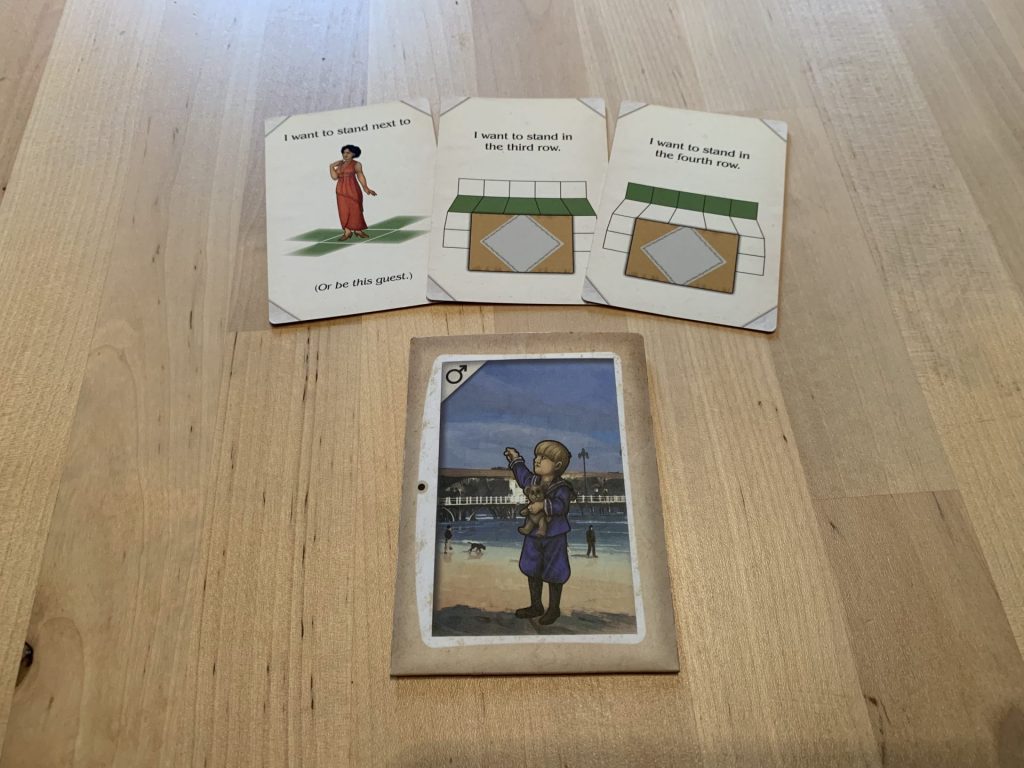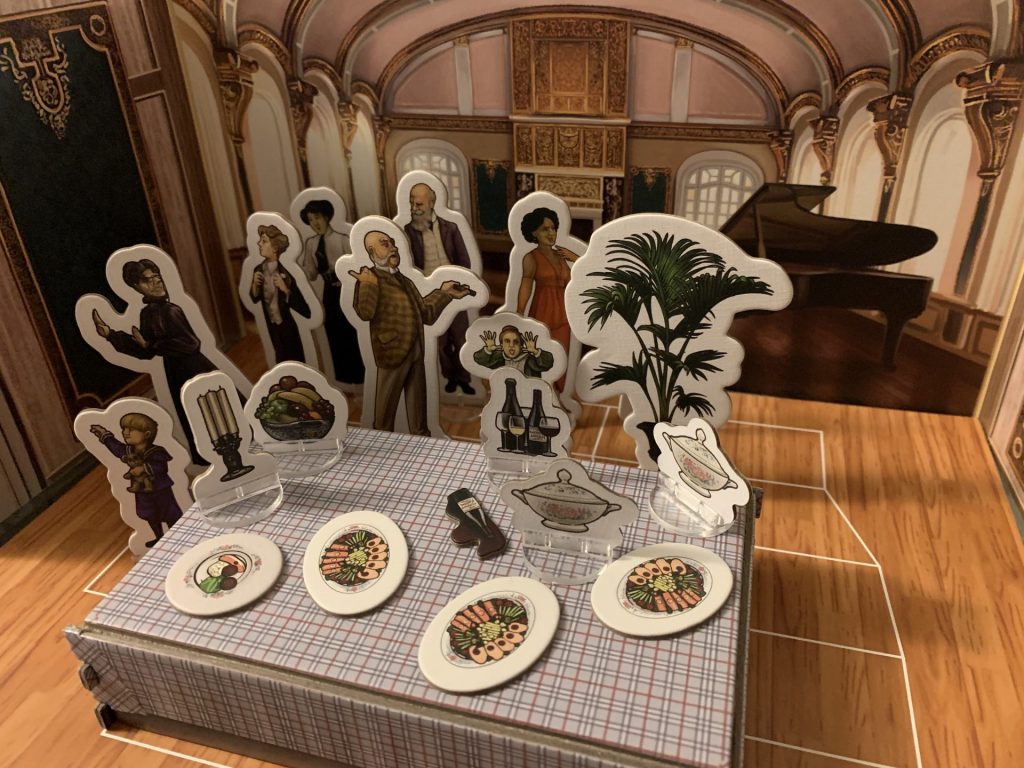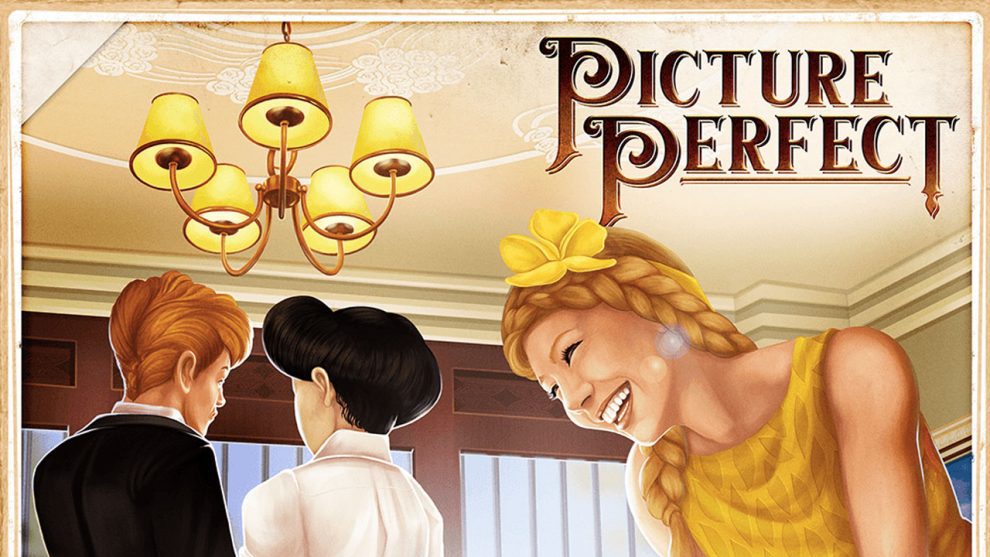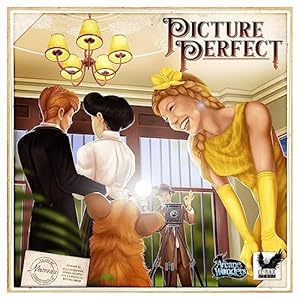Disclosure: Meeple Mountain received a free copy of this product in exchange for an honest, unbiased review. This review is not intended to be an endorsement.
At Spiel 21, my traveling companion was drawn to a curious little game we saw at the Arcane Wonders booth. Players were sat around the table with their own tableaux and a small army of cardboard standees. Picture Perfect, it was called. From outside the game, only walking by, it was somewhat inscrutable. The box, which I’m only now realizing does not show a towering woman looking down at two regular-sized people, promised a fundamentally pleasant time. Having now played it, that’s exactly what it delivers.
Picture Perfect is a logic puzzle and memory game in which you, the photographer, have been hired to corral a dinner party’s worth of guests into posing for a group portrait. The guests can’t make this easy, of course. Each has a trio of preferences, assigned at random during setup, related to where they would like to be, and they keep these preferences a secret.

Each round, you will have access to the preferences of a varying number of guests, usually two or three. Though the occasional guest’s information will circle back to you—each round uses a different method for changing up who has access to what—for the most part you will be viewing the contents of each envelope once, if you see them at all. You are primarily relying on memory to see that everybody gets a position to their liking.
The individual preferences are not too complicated. Some guests will want to stand on the left or right side of the table, in the middle or back row, some won’t want to stand next to any men, these sorts of things. Some of the preferences imply inter-character relationships: wanting to stand next to a specific guest, wanting not to stand next to a specific guest. My personal favorite is the preference specifying that another guest’s face not be visible in the final photo. There are three such cards, one targeting the young blonde woman shown on the box, one targeting the sassy maid, and another targeting the house corgi. That’s the kind of implied pettiness in narrative that I can really get behind.
The randomization of the preference cards is a smart way of guaranteeing that no two games will be exactly the same, but it does create the possibility of conflicting preferences. The house plant—one of the guests is a house plant—may want to be on both the left and right side of the table, which isn’t possible. Fortunately, you don’t lose any points unless you’ve posed someone without meeting any of their requirements. You score significantly more for meeting all three, of course, but meeting one is enough.
I like that very much as a design choice, because it means the only way you’ll lose points is if your memory fails completely. Remember one thing about each guest and you’ll do fine. That makes the game more accessible to families, since kids may struggle to keep track of all the details. Part of the fun of the game is figuring out ways to set the standees so that you can remember their preferences as you add more and more. “Why did I put the dandy in the back corner,” you’ll mumble to yourself. Once the final round is finished, before scoring begins, everyone is encouraged to take a photograph of their tableau with a cell phone. Smart for marketing purposes, and a cute way to tie the theme together at the end.

As I said in the opening, I found Picture Perfect immensely pleasant. If I’m suggesting a game to play with children of a certain disposition, I’d recommend it in a heartbeat, and I imagine I would always happily play it at someone else’s request. One of the smartest things about this design, whether it was done intentionally or not, is the lack of competitive feeling. Picture Perfect never feels like you’re playing against anyone else, and it’s all the more enjoyable for that.
Has everyone found a seat? Ready? Okay, say “Cheese!”












Add Comment